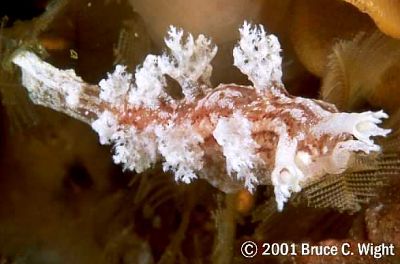Unknown nudibranchs from California
December 7, 2001
From: Bruce Wight

Hi guys,
I have seen the branch in California that appears in Andy's photo from July 8th, 2001 in the Unidentified Nth American section. My wife and I had a branchers dream trip July 27th this year at San Miguel Island [California]and we found three branchs new to us on a single dive. They were all fairly close together on the same reef at a depth of about 65 feet and the water temp was 56 degrees F. I saw several of each variety. All were found on a species of feather hydroid known as Aglaophenia. The location was called the high spot near Wilson's Rock. I showed them to many of the experts. Fellow dedicated branchers, Mike Miller, Marc Chamberlain and Alan Grant, who were on the trip with us, had never seen them before. Hans Bertsch had never seen them before and said they may be some kind of Bornella. Dave Behrens had never seen them and said they may be a Dendronotus frondosus. Sandra Millen had also never seen them and thinks they potentially could be all different color variations of Dendronotus subramosus because they all have a smooth stalked rhinophore sheath with a small, even crown, they have few oral papillae, they have cerata bases which are solid before a rosette branching. In addition, they are all on Aglaophenia which this species eats.
I think Sandra is right about the orange one (my photo LOWER LEFT and Andy's images) but I don't know about the other two. I will let you know if I find out any more nformation.
Take care,
Bruce Wight
bwproductions@earthlink.net


Thanks Bruce,
I will be interested in other people's comments. I have my doubts about any of yours being the same as the animal in Andy's photo however. In his animal the rhinophores (including the stalk) is much smaller than the 'cerata' whereas in your orange animal the rhinophore is larger. Secondly his animal has only 2 pairs of 'cerata' and they do not appear to be branched gill-like structures like in your animals but more like the cerata in Scyllaea. Certainly an interesting find.
Best wishes,
Bill Rudman
Related messages
-
Dendronotus subramosus at work
From: Jan Kocian, June 4, 2007 -
Mystery slug from Cannon Beach, Oregon
From: Minette Layne, January 12, 2007 -
Dendronotus subramosus from Monterey, California
From: Clinton Bauder, January 27, 2006 -
Dendronotus subramosus - Take 2
From: Clinton Bauder, September 15, 2005 -
Dendronotus subramosus? from California
From: Sean Kearney, March 23, 2004 -
Mystery slug is Dendronotus subramosus
From: Dave Behrens, August 9, 2003 -
Nudibranch from British Columbia
From: Andy Murch, July 8, 2001
